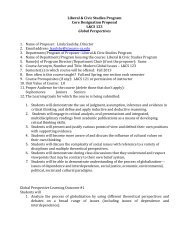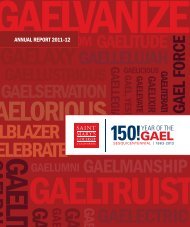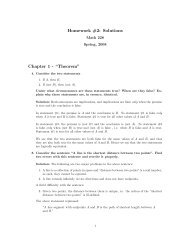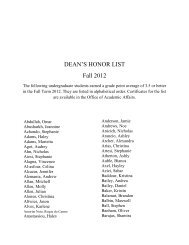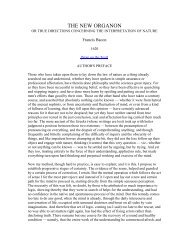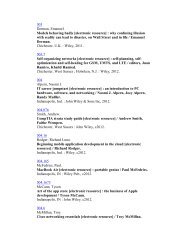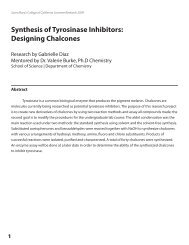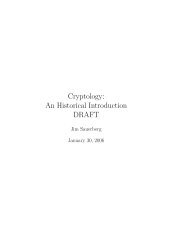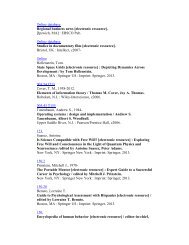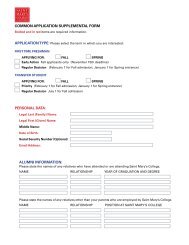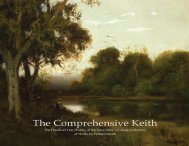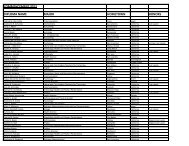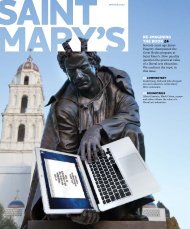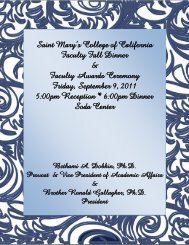2008-09 Catalog - Saint Mary's College of California
2008-09 Catalog - Saint Mary's College of California
2008-09 Catalog - Saint Mary's College of California
Create successful ePaper yourself
Turn your PDF publications into a flip-book with our unique Google optimized e-Paper software.
Education CurriculumMONT 111 Advanced Field Observations in EarlyChildhood Education (.25)Development <strong>of</strong> observation skills and an introduction to a variety <strong>of</strong>children’s environments. Observations in various settings (public and private,infant/toddler, ECE and elementary school programs, day care, andchild care centers, etc.) Exploration <strong>of</strong> skills and techniques <strong>of</strong> observationand descriptive, analytical reporting. Fieldwork and seminar required.MONT 112 Advanced Field Observations in EarlyChildhood Education (.25)Development <strong>of</strong> observation skills and an introduction to a variety <strong>of</strong>children’s environments. Observations in various settings (public and private,infant/toddler, ECE and elementary school programs, day care, andchild care centers, etc.) Exploration <strong>of</strong> skills and techniques <strong>of</strong> observationand descriptive, analytical reporting, Fieldwork and seminar required.MONT 161 Montessori Philosophy ina Cultural Context (1)This course examines the philosophical foundations <strong>of</strong> Montessori educationin a developmental context and within the further context <strong>of</strong> thefamily and the community. Along with, and embedded in the Montessoriphilosophy, students will consider the psychology <strong>of</strong> parenting and practices,parent-teacher relationships, locating community and pr<strong>of</strong>essionalresources and the critical value <strong>of</strong> full inclusion.Cross Cultural ProgramsCLAD 510 Lecto-Escritura for the Bilingual ChildThe course covers instructional delivery in bilingual classrooms, methodologyfor the teaching <strong>of</strong> reading and writing in Spanish, and factorsto consider in the selection <strong>of</strong> materials for instruction and assessment.Course prepares teachers for BCLAD Test 4.CLAD 520 Latino Origins and HeritageA literature-based course focusing on the origin and heritage <strong>of</strong> Latinos.An examination <strong>of</strong> the social, religious, and political values <strong>of</strong> the cultureand the similarities and differences between Latin American nations.Cross-listed with Spanish 161.EducationEDUC 210 Learning, Development and Cognitionin a Social ContextPsychological principles and major learning theories applied in educationand counseling. Stages <strong>of</strong> growth focusing on biological, psychological, andsocial development, and education <strong>of</strong> the whole child. Synthesis <strong>of</strong> affectiveand cognitive perspectives, right/ left hemisphere brain function, languagedevelopment and interaction, and sex-role socialization from birth throughadult phases. Developmental issues and their effects on individuals andfamilies in schools and marriage, family, child counseling settings. (Separatesections are given for Multiple and Single Subject Credential programs.)Elementary Education(Multiple Subject CLAD Emphasis)ELCD 253 Teaching Reading in Elementary SchoolsCurrent theories and methods <strong>of</strong> teaching reading in elementary schools.Development <strong>of</strong> reading curriculum. Emphasis on scope and sequence <strong>of</strong>instruction and its evaluation. Application to diverse cultural communities.35 hours plus field visits.ELCD 345 Curriculum and Instruction: Social Scienceand the HumanitiesMethods and curriculum with social science emphasis for the selfcontainedclassroom, including cross-cultural teaching, group process,integrated curriculum, classroom management, creating learning environments,critical thinking and planning. Development <strong>of</strong> integrated thematiccurriculum.ELCD 410 Culture/Equity and Language/EquityThis course covers the nature <strong>of</strong> culture, ways to learn about students’cultures and ways teachers can use cultural knowledge to enhance studentlearning. Cultural contact and cultural and linguistic diversity in <strong>California</strong>and the United States are examined. A major focus is the role <strong>of</strong> languageswithin the classroom and school in relation to learning, and the impact<strong>of</strong> these on issues <strong>of</strong> equity, self-esteem and empowerment. Historicalperspectives and social issues are explored in relation to issues <strong>of</strong> powerand status as they are manifested in the classroom and school culture.91



